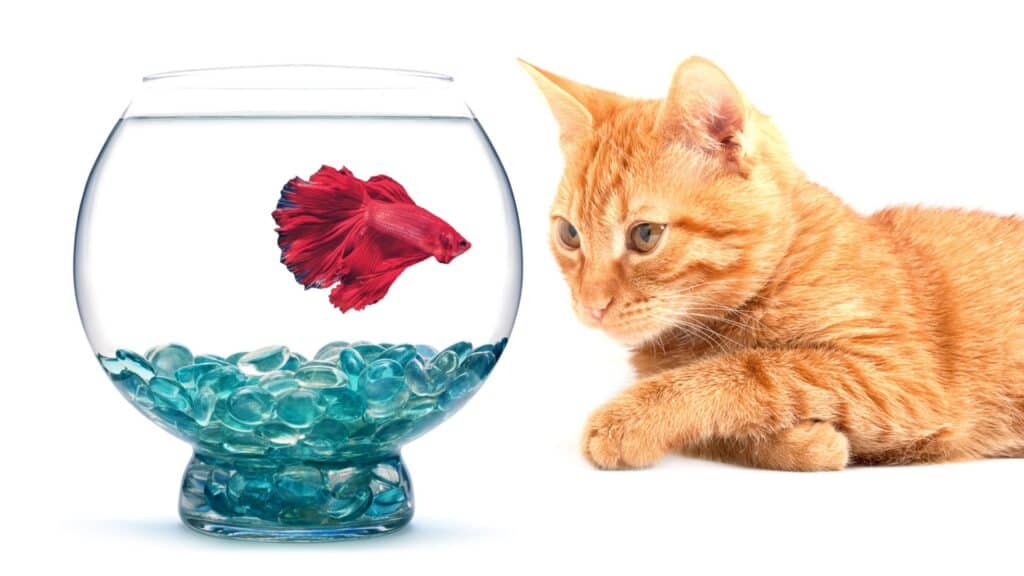Are betta fish poisonous to cats?
Now, that sounds like a bizarre question, right? But you’d be amazed (and horrified) at just how many pet fish fall victim to the family cat. It would be bad enough if Tibbles gobbled up your betta buddy, but if Tibbles got poisoned, too? Double-bad!
So, we put this guide together to put your mind at ease and suggest a few ways of keeping your fishy friend safe from the attention of your cat.
Are betta fish poisonous to cats?
First of all, you’ll be relieved to learn that betta fish are NOT poisonous to cats.
Some species of fish, like pufferfish, are toxic when ingested. Other fish, including boxfishes, secrete poisonous mucus from their skin, which would be toxic if you ate the fish. However, your betta is not toxic.
Although male betta fish can defend themselves from rival males’ attacks, that’s the bettas’ only form of defense. These fish don’t contain or secrete any form of poison that could harm a cat if it ate one, although raw fish may contain parasites and bacteria, especially if the fish had been dead for some time before the cat ingested it.
Choking hazard
That being said, although betta fish are small, typically measuring between two and three inches long, they can still present a choking hazard to a curious cat that tries to swallow one. Bettas also contain many tiny bones that could become wedged in your cat’s throat.
What should I do if my cat chokes?
If your cat swallows or eats your betta fish, it may choke. That’s potentially a very serious condition for your cat. So, what action should you take?
The symptoms of choking cats include:
- Coughing or gagging
- Pawing at the mouth
- Distress
- Rubbing the face on the ground
- Salivating or drooling
- Blue mucus membranes (cyanosis)
If you suspect your cat is choking, you should not hesitate to get it to the vet, as any delay could prove fatal for your pet.
First aid for a choking cat
If your cat is choking, here’s what to do:
- Calm and restrain your cat if it’s distressed and panicking
- Look inside the cat’s mouth. If you can see the obstruction, use a large pair of tweezers to retrieve it.
- Don’t push the object, as it might go deeper down the cat’s throat. Never try to put your fingers down the cat’s throat; you could damage the sensitive tissues there and make the situation worse.
If that doesn’t work, get your cat to the vet ASAP.
Has my cat been poisoned?
If your cat eats a betta after the fish has already been dead for a few days, there’s a chance the cat could be poisoned by bacteria. You must also keep all your fish medications and water treatments stored safely out of your pet’s reach, as some of the chemicals these substances contain can be poisonous to cats if accidentally consumed.
Symptoms of poisoning usually appear within a couple of hours of the cat eating the toxic item, and they include:
- Vomiting
- Salivating
- Convulsions
- Diarrhea
- Difficulty breathing
- Coma
- Swelling of the skin
- Lethargy and depression
- Changes in appetite, urinating and drinking
If you think your cat has been poisoned, seek veterinary advice as soon as possible. The sooner you get your cat to the vet, the more likely it is that your cat will make a full recovery.
Why do cats like fish?
Cats are predators and are attracted to anything small that could be viewed as potential prey. If the object of your cat’s attention runs away, the cat will most likely chase it…unless you have a very lazy kitty!
So, the sight of your brightly colored betta fish swimming happily in its tank might easily catch the attention of your hunting cat. Many felines will pat the aquarium glass and follow the fish around the tank, trying in vain to snag one.
It’s not that your cat hates your betta buddy or is jealous of the attention you lavish on your fishy friend; it’s simply that the cat is a natural-born hunter, and it loves the thrill of the chase!
Will my cat eat my betta fish?
Cats are primarily carnivores, eating a diet of mostly meaty protein as well as a small number of veggies and some fruits. So, cats do eat fish, and that could include a tropical pet if the cat can catch it.
Obviously, your cat doesn’t know your betta fish is a potential meal while it’s safely behind the aquarium glass. However, if you leave the lid off the tank for cleaning and your cat manages to grab your betta, it may well make a meal of your betta.
How can I protect my fish from my cat?
So, how can you protect your betta fish from your cat?
There are a few effective measures you can take to keep your betta buddy safe from unwanted attention from Tibbles.
Prevent your cat from getting into your fish tank
The best way to keep your betta fish safe is to stop your cat from getting into the tank in the first place.
Now, you’re going to want your betta tank in a room where you can view and enjoy it, so you don’t want to hide your fish away somewhere you never go. However, you also need to remember to close the door to the room when you’re not around to keep an eye on your cat.
Choose a tank with a tightly fitting lid
Bettas can jump. They do so in the wild during dry seasons when the water levels fall and food becomes scarce.
In captivity, betta fish can sometimes jump right out of a tank that doesn’t have a lid on it, especially if something frightens them. If your cat is “chasing” your betta fish through the tank glass, your fish might jump right out of the tank to try to escape the perceived danger, not realizing it’s leaping right into the hunter’s jaws!
So, choose a tank for your betta that has a tight lid or a cover slide at the very least. A lid also prevents evaporation and stops dust and other debris from drifting into the water.
Taking the plunge! Your tank lid should also be strong enough to withstand the cat’s weight, should Tibbles decide to jump onto the top of the tank. Although cats can swim, your kitty could easily drown if she fell through the tank lid into the water and couldn’t get out again. Putting objects on the tank lid can create the illusion that there’s no room on top of the tank, so the cat is less likely to jump on it.
Place the tank out of your cat’s reach
Cats are agile creatures that can leap from the floor up onto shelves and countertops with ease. So, when deciding where to put your fish tank, make sure you put the aquarium somewhere your cat can’t get to. Place any tables and chairs at least three feet away from the tank so the cat doesn’t try to use those items as a launchpad from which to jump onto the tank lid.
You also need to keep all the cables associated with the aquarium’s electrical equipment well out of reach if the cat becomes tangled in them. They say that “curiosity killed the cat,” and although tipping the tank over might not prove terminal for your cat, that could prove disastrous for your fish…not to mention your carpets!
Choose a sturdy tank stand
A lightweight fish tank stand set on a flimsy stand is asking to be knocked over by your cat, especially if the kitty likes to stand up and rest her paws on the glass.
So, pick a sturdy tank and a stand that can’t be easily knocked or tipped over. If you keep a small betta tank on a countertop or desk, make sure the cat can’t get behind the aquarium and push it over the edge of the surface.
The best aquarium stand to choose is one that doesn’t have a lip or ledge running around it; if there’s no obvious foothold, the cat will be less likely to make the leap.
Use cat repellent around your betta’s tank
Some owners of especially persistent nosy felines take more drastic steps to keep kitty away from the betta tank. Try placing something scented with citronella, wintergreen, or eucalyptus close to or on the aquarium. Cats hate all three of those smells and will keep clear.
If the tank is on a countertop, or you’re concerned the cat will try to jump on top of the aquarium, you could try placing sticky tape or aluminum foil on the aquarium lid or use it to create a border around the base of the tank. Cats hate the textures of those materials, so they’ll avoid stepping on them.
Take extra care when cleaning your betta’s tank
While you’re cleaning your betta tank or carrying out weekly partial water changes, you’ll most likely have the aquarium lid open for some time.
That can provide the perfect opportunity for a cat to try to grab a betta. So, while you’re focusing on tank maintenance, it’s a good idea to shut the cat out of the room so the kitty can’t launch a surprise attack on your fishy friend while your back is turned.
What should I do if my cat eats my betta fish?
If your cat has eaten your betta fish, the first thing to do is observe the cat for signs of choking.
If the fish has completely disappeared and your cat has swallowed it, keep an eye on the cat for a few hours afterward. Most likely, nothing untoward will happen to the cat, but be on the lookout for signs of poisoning just in case.
Can cats stress fish out?
Although your betta is safe inside your tank, continual harassment from your cat will stress your fishy friend out. Too much stress will weaken your betta’s immune system, which makes it more susceptible to diseases and attacks by common fish parasites. There are a few things you can do to keep your betta’s stress levels down:
Cover up!
Mitigate the stress a cat’s attention will cause your betta by making sure the cat is always kept at least two feet away from the tank. Even when the tank lighting is switched off, your cat’s keen eyesight will spot the fish moving around inside the aquarium. So, to protect the fish and reduce its stress, put a piece of fabric over the tank during lights-out*.
*Remember to switch the tank lights on for at least eight to 12 hours per day to give your living plants the light they need to photosynthesize and to show your betta when it’s time to wake up and eat and when it’s time to sleep.
Create a hiding place
Bettas like to have somewhere to take shelter and chill out if they want to, so make sure your betta buddy has plenty of lush plants, hollow floating logs, and caves in his tank.
If your betta knows it can get away from your curious cat, it’s less likely to become stressed.
No-cat zone!
If your cat is a persistent offender and simply refuses to leave your betta fish alone, you might have to consider shutting sweet Tibbles out of the room altogether for a few weeks.
After that exclusion time, allow the cat back into the room, but be sure to provide the cat with plenty of catnip toys or treats to distract her from your betta. If there’s a more intriguing or tasty alternative, chances are, your cat will lose interest in the fish.
Final thoughts
Although it doesn’t happen very often, some betta fish do fall prey to their owner’s pet cat.
Keep your betta safe by placing the tank in a difficult place for the cat to access, and choose a sturdy tank and stand the cat can’t knock over. Cover the aquarium when the lights aren’t switched on to keep your betta out of sight, and always use a tank with a tightly-fitting lid or cover slide.
If your cat does eat your betta fish, observe the cat closely for signs of poisoning as described above, and seek veterinary attention as soon as possible.











